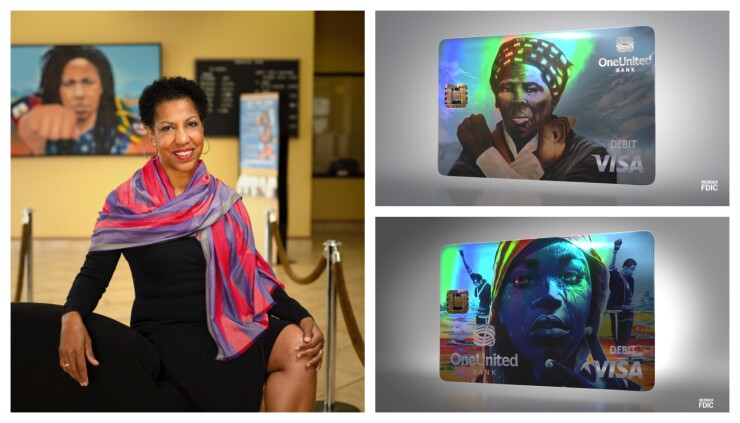
The largest Black-owned bank in the country, OneUnited, launched a TV campaign Wednesday to promote its new OneLove card as part of a Juneteenth celebration.
The One Love campaign and accompanying debit card were part of a larger effort by the bank to educate consumers about the significance of Juneteenth, according to Teri Williams, president and chief operating officer of OneUnited, which has $606 million of assets and is based in Boston.
"It's a new holiday, so a lot of people maybe don't understand it, and so we really felt like it was an opportunity for us to explain it," Williams said. "We do think that it is a holiday that is worth celebrating — it's about freedom."
Many banks, credit unions and other financial service providers
President Joe Biden officially recognized the federal holiday in 2021 to observe the day more than 250,000 slaves in Texas were declared free by the U.S. in 1865.
Many of the diversity initiatives undertaken by financial institutions — such as heightened commitment to diversity in hiring and investments in Black banks and businesses — came after the protests for George Floyd in 2020. This movement added gravitas to the new holiday, Williams said.
As the holiday approaches, other banks and other financial institutions have also found ways to go beyond closures and commemorate the end of slavery in the U.S.
Chase, Wells Fargo, Citi and other federally regulated banks will be closed Wednesday in accordance with the Federal Reserve System's Juneteenth observance. Credit unions across the country, including Navy Federal, Pentagon Federal and Bethpage Federal, will also be closed for the holiday.
As protesters continue to take to the streets to express outrage over racial injustice and inequality, banks — for the first time — will commemorate the date that marks the end of slavery in the U.S.
In an emailed statement to American Banker, JPMorgan Chase pointed to its Advancing Black Pathways commitment aimed to build on economic foundations for Black communities. The statement also said this initiative has "supported over 16,000 Black businesses and entrepreneurs through business boot camps and coaching" and "committed $30 million to historically black colleges and universities," over the last five years and will continue these efforts.
Citi held a panel discussion on June 10 in its New York headquarters — hosted by its Black heritage network, a network for Black employees at Citi — to promote mental well-being in communities of color ahead of the holiday. On June 13, Wells Fargo commemorated Black musical history in a two-night concert in Houston featuring an array of R&B, blues and hip-hop artists that explored the history of music as it relates to Black culture.
At OneUnited, the bank's status as a community development financial institution has been a testament to its past and continued investment in underserved Black communities, Williams said.
"Promoting financial literacy by providing loans and capital to underserved communities, is not only a good thing for our communities — and particularly for the black communities — but we think it's a good thing for America."
Some fintechs have also begun to honor Juneteenth, including Paysafe, a London credit card processing company servicing small businesses globally. CEO Bruce Lowthers said Paysafe has focused its efforts on assuring that Juneteenth programs in the U.S. offices are not limited to a single day, but that they bolster diversity initiatives and create space in the office for employees' diverse identities.
"We really tried to focus all of our programs more on a kind of sustainable change versus just celebrating the holiday itself … but we really have geared up a lot of things around the holiday," Lowthers said.
In addition to the day off, mentoring programs and social events, Paysafe will also host internal education sessions to inform staff on Juneteenth's historical significance, Lowthers added. He said that even for a company focused on payments, promoting diverse thoughts and celebrating the many different identities in the company is still essential.
"I thought everybody had already concluded that diversity was the best answer for business," Lowthers said. "The outcomes when you bring a group of people together and they feel comfortable and have their community in the company — to be creative and have trust in each other — that is really where all the magic happens in business."






